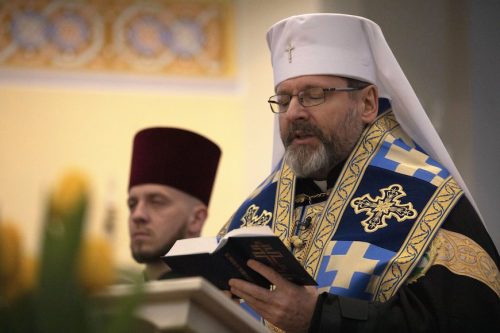By Jonathan Luxmoore | OSV News
(OSV News) — The head of the Ukrainian Catholic Church has warned against moves by President Volodymyr Zelenskyy’s government to outlaw Orthodox communities linked to Moscow, and urged his countrymen to “give Russians a chance to repent.”
“I don’t wish to give prescriptions to our legislators but we were once banned as well, and we survived underground,” said Major Archbishop Sviatoslav Shevchuk of Kyiv-Halych. “Our own moral authority was saved by becoming a martyred church which did not collaborate with the Soviet authorities. It’s important to understand that banning a church doesn’t mean ending its existence.”
The church leader’s comments circulated after legislation was tabled Jan. 19 by Prime Minister Denys Shmyhal in Kyiv’s Verkhovna Rada parliament to prohibit “activities by religious organizations” affiliated with centers “in a state carrying out armed aggression against Ukraine.”
The archbishop told the online news outlet Ukrainska Pravda the state had a right to ensure national security by identifying and acting against “dangerous traitors.”
However, he cautioned that banning the Moscow-affiliated Ukrainian Orthodox Church (UOC) also could also give it “the palm of martyrdom,” and said the natural instinct of “righteous anger” needed “transforming and framing.”
“A church isn’t just a religious structure, an organization with a charter, leader and center — it’s also people with constitutional rights, and while there are people in Ukraine oriented toward Moscow’s Orthodoxy, this church will exist even if it’s illegal under state law,” Archbishop Shevchuk said.

“You shouldn’t be persecuted for belonging to some church structure, but for crimes against our country, and here we are all equal. … The point is that our northern neighbor, who is killing us today, shouldn’t be able to use any church for his political ends.”
The UOC has been losing clergy and parishes to a new independent Orthodox Church of Ukraine, founded in Dec. 2018 under Metropolitan Epiphanius of Kyiv with backing from the Ecumenical Patriarch, whose existence is bitterly opposed by Russia’s Moscow Patriarchate.
Government hostility to the UOC increased after Russia’s Feb. 24, 2022 invasion, and at least two bishops face prison for inciting religious enmity and collaborating with occupation forces, while sanctions and citizenship bans have been imposed on other senior UOC clergy in the wake of security raids on UOC premises.
However, some Ukrainians have warned the government’s draft law lacks precision, and say a blanket ban on activities by the UOC, which also claimed independence from Moscow last May, could fuel accusations of religious persecution.
Russia convened a United Nations Security Council meeting Jan. 17 on moves to outlaw the UOC, while U.N. Assistant Secretary-General for Human Rights Ilze Brands Kehris also expressed concern for religious rights.
Meanwhile, UOC members urged Zelenskyy’s government to protect their freedoms in a mid-January petition, recalling that many Orthodox Church members were fighting with the Ukrainian army against “Russia’s aggressive invasion.”
On Jan. 16, the UOC distanced itself from a speech by Russia’s UN envoy, Vasiliy Nebenza, accusing Zelenskyy of “authoritarian dictatorship,” and said it had not requested “assistance in protecting its rights” from Moscow.
In his Ukrainska Pravda interview, Archbishop Shevchuk said Russia’s Orthodox Church had been used as an “instrument of the state” under Soviet rule, and had taken control of Ukrainian Catholic properties when his Ukrainian Catholic Church was “forcibly liquidated” in 1946.
He added that Ukrainian Catholics had tried to “heal past wounds” by seeking dialogue and “normal relations,” but said neither the Moscow Patriarchate nor the UOC’s current leader, Metropolitan Onufriy (Berezovsky), had wished to talk.
“When we hear the word ‘Russians’ in Ukraine today, images of mass torture, destroyed cities and villages appear before our eyes. Ukrainians naturally feel Russians are foreigners and murderers, who came to take everything from us,” Archbishop Shevchuk said.
“On the other hand, we also wish, in a Christian way, to give everyone a chance to repent. Right now, this is very difficult, and anger is a natural human instinct — indeed, if all the crimes we see did not make us angry, this would make us complicit in evil. … But anger needs transforming and framing. In the Christian sense, righteous anger provides material for the virtues of courage and resilience.”
The archbishop said Ukrainian Catholics were not currently demanding the return of Catholic properties given to Orthodox parishes by past Russian and Soviet rulers, adding that he hoped both Catholic and Orthodox communities would enjoy access to historic sites such as Kyiv’s St. Sophia Cathedral and Pecherska Lavra monastery.
However, he said he also feared Ukraine would be a “wounded society” after victory in the war, bringing “aggressiveness and conflict,” and making “transparency and openness” difficult.
“I urge everyone to remember and understand that the war in Ukraine is a war for democracy and values,” Archbishop Shevchuk said.
In a Jan. 20 appeal to the U.N. Security Council, co-signed by other Christian, Muslim and Jewish leaders, Archbishop Shevchuk said religious freedom had been one of the “first targets” of the Russians, who had destroyed or desecrated over 270 churches and religious buildings, torturing and killing dozens of clergy from all faiths.
He added that Ukraine’s achievements in providing freedom of conscience were recognized worldwide, and he said other countries could best ensure this survived by helping the country resist Russia’s invasion, “which brings death, slavery, ignorance and religious oppression.”






















